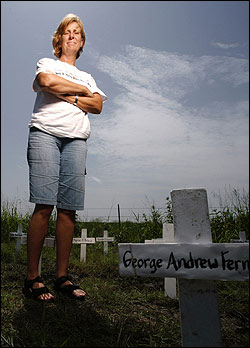It’s the most remarkably effective political protest in memory. Three weeks ago, Cindy Sheehan was just another mourning mom who had lost a son to combat in Iraq. Then she plopped herself down in a roadside ditch in Crawford, Texas, demanding to meet with President Bush during his annual vacation—demanding to know why her son, Casey, had made the ultimate sacrifice.
And all hell broke loose.
Surely Sheehan is not the first person to go to Crawford with a gripe in the past five years. But as a mourning mother, she has a certain status. It helps that she is articulate, determined, and a seemingly indefatigable worker of the media. It also helps that the White House press corps is stuck in tiny Crawford for a month with nothing to do. But, as with all good protests, the real success comes from allowing the opponent to reveal himself. In this case, the political theater is simply set in motion by Sheehan; the real actor is Bush.
Bill Clinton would never have let this drag out. Clinton would have met with Sheehan, charmed her socks off, and posed for a few photos afterward for good measure. But then, I don’t remember Clinton taking monthlong vacations, either.
Sheehan is making her point by allowing Bush to demonstrate his core of arrogance. Before a two-hour bike ride Saturday, Aug. 13, when asked why he had time for that but not for a quick sit-down with Sheehan, Bush replied that he had to go on with his life.
As though a woman camped in a ditch had the power to disrupt his life. As though her son had a life left to go on with.
The longer this has gone on, the more the hype around Sheehan has grown. Supporters in Seattle and from around the country have flocked to join her. Last Wednesday night, Aug. 17, candlelight vigils in support of Sheehan were held in Seattle (1,500 strong) and in communities across the country. Many of her supporters are military families—people who’ve never gone to a peace march.
Out of nowhere, Sheehan is being touted as the leader the antiwar movement has supposedly been lacking. There is no question that Sheehan has galvanized the opposition. Her loss of a son gives her legitimacy the antiwar movement doesn’t have in the eyes of some. Her refusal to back down in the face of the elements, hostile locals, and possible arrest has elevated her further.
The simplest measure of her effectiveness is the zeal with which the right wing is tearing into her—calling her a disgrace to her son’s memory and a dupe of the radical antiwar left. She is neither of these, of course, in the eyes of the public—which is precisely why the right is attacking.
Seventy percent of Americans polled last week thought Bush should meet with Sheehan. He won’t, of course. He’ll finish his vacation in the comfort of his ranch and then go back to Washington. Three miles away, Sheehan will get arrested, or not, and then doubtless follow him back to Washington, her life transformed by the remarkable success of her simple protest.
But in the process, we will have learned a little more about Bush. We will have learned, again, that he is a man comfortable among acolytes and big donors but deeply uncomfortable when confronted with a skeptic, in or out of his inner circle. We will have learned that a man who has yet to attend the funeral service of a single fallen Iraq soldier can’t make time for their families, either, unless it’s on his terms. And we will have learned that he lacks the simple gift of empathy, which Clinton had in spades, and which would have allowed him to defuse the protest with a minimum of fuss or time.
Cindy Sheehan is not the anointed leader her admirers wish her to be. She is too much a single note to hold the media’s interest for long. But her loss has struck a chord with the public, and she has put a face to the suffering that the administration had previously mostly succeeded in keeping anonymous.
But the protest, ultimately, is not about her. It is about George Bush, a man who cannot make time when he’s goofing off to meet with a grieving mother when she is an outspoken critic. Shame on him.







